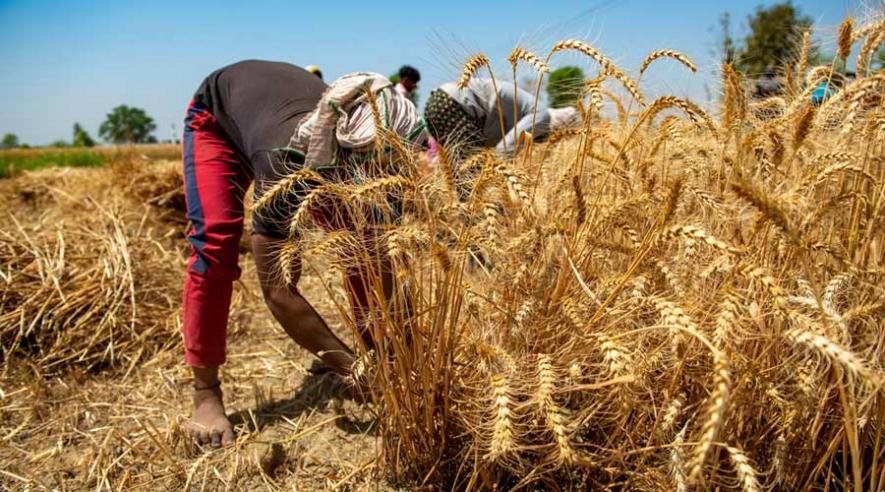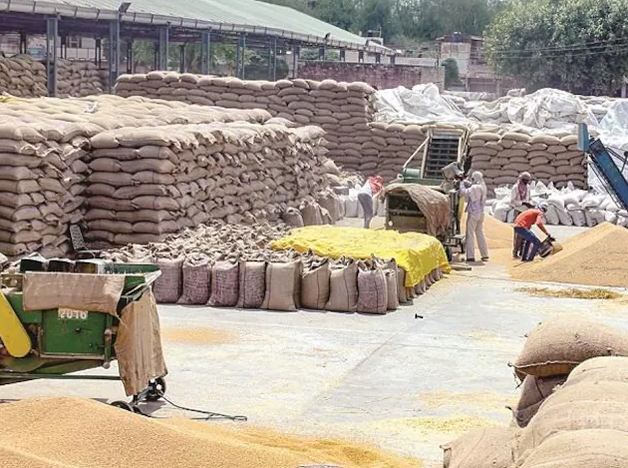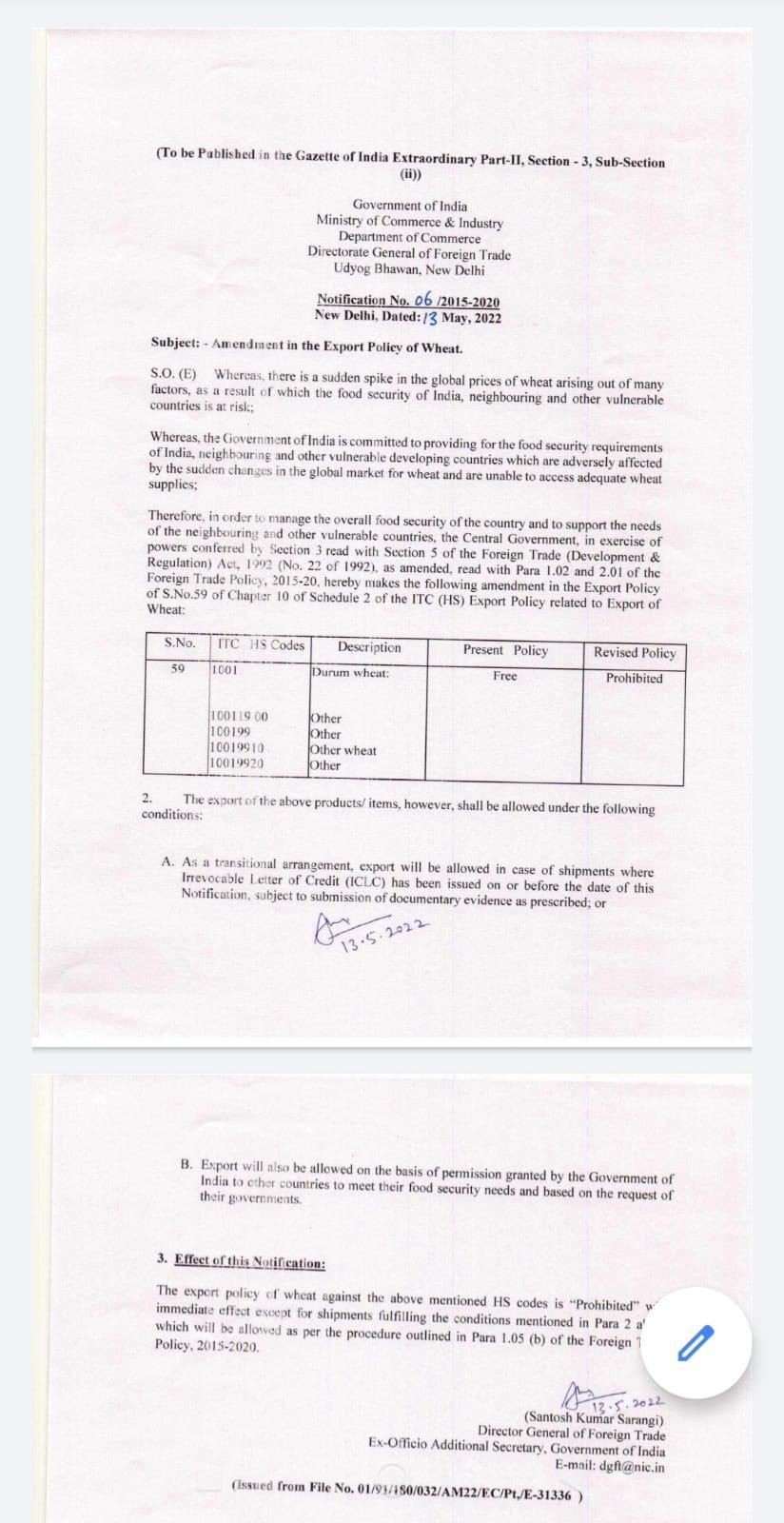Ban on Wheat Exports 'Anti-Farmer' Move, say Punjab Farmers' Unions
Union government not letting farmers reap gains due to higher prices of their crops in the overseas markets, say farmers.
PTI
16 May 2022

Representational Image. Image Courtesy: Telegraph India
Chandigarh: Farmers' unions in Punjab on Monday dubbed the Centre's decision of banning wheat exports as an "anti-farmer" move, saying that the Union government is not letting them reap the gains due to higher prices of their crops in the overseas markets.
They also slammed the Centre for not announcing a bonus of Rs 500 per quintal of wheat, as demanded by them to compensate the drop in the yield on account of shrivelled grains due to intense heat wave in March.
The Union government has banned wheat exports in a bid to check high prices amid concerns over lower wheat output this year.
According to the government, the decision will help control retail prices of wheat and wheat flour, which have risen by an average 14-20 per cent in the last one year, besides meeting the foodgrain requirement of neighbouring and vulnerable countries.
A number of farmers, especially big wheat growers, in Punjab have stored the crop in anticipation of fetching higher returns later, said farmers.
"It is an anti-farmer decision," Bharti Kisan Union (Ekta Ugrahan) general secretary Sukhdev Singh Kokrikalan said on Monday.
He said the export ban will hit those farmers who had stored the crop in anticipation of fetching higher returns when the prices would increase in the domestic market.
Bharti Kisan Union (Lakhowal) general secretary Harinder Singh Lakhowal too condemned the Central government's decision.
"This decision is not in the interest of farmers," said Lakhowal, adding that the government should have continued with the export to take advantage of higher prices in the international market.
Shiromani Akali Dal chief Sukhbir Singh Badal on Sunday had slammed the Centre's decision of banning wheat exports, saying that this move will cause a drop in demand for the crop and farmers will be the worst sufferers.
The Punjab government on Sunday ordered continuation of wheat procurement operations at the Minimum Support Price (MSP) at 232 mandis in the state till May 31.
The state's food and civil supplies minister Lal Chand Kataruchak on Sunday said that the restriction on wheat exports was likely to result in a dip in prices of the food grain in the domestic market.
"As a result, some farmers who had stored the wheat produce in anticipation of fetching higher prices later, might have a rethink now and opt to sell the wheat. Therefore, it was important that the facility of government purchase at MSP continues to be available to them in order to avoid distress sale," Kataruchak had said.
Wheat production in Punjab is expected to drop by around 30 lakh tonnes to 147 lakh tonnes against the projection of 177 lakh tonnes on account of adverse impact on crop yield due to sudden high temperature in the month of March.
Wheat procurement from Punjab is also expected to miss the target of 132 lakh tonnes due to lower yield.
Out of a total arrival of 102.27 lakh tonnes in grain markets so far, the government procurement agencies have bought 96.17 lakh tonnes while private traders purchased 6.10 lakh tonnes, according to official data.
Punjab Roller Flour Millers Association president Naresh Ghai, however, hailed the Centre's move, saying that the ban on exports would help in stabilising wheat prices.
He said wheat prices in Madhya Pradesh and other state mandis have risen to Rs 2,200 per quintal.
The Centre has earlier relaxed procurement norms to allow up to 18% shrivelled wheat grains in Punjab and Haryana.
Wheat Exports Banned One Month After PM Modi Said ‘India Can Feed the World’
Ban comes into immediate effect as domestic prices skyrocket. Onion seed exports restricted.
PTI
14 May 2022

Image Courtesy: Business Standard
New Delhi: India has banned wheat exports with immediate effect as part of measures to control rising domestic prices, according to official notification.
However, the export shipments for which irrevocable letters of credit (LoC) have been issued on or before the date of this notification will be allowed, the Directorate General of Foreign Trade (DGFT) said in a notification dated May 13.

"The export policy of wheat … is prohibited with immediate effect…," the DGFT said.
It also clarified that wheat exports will be allowed on the basis of permission granted by the Government of India to other countries to meet their food security needs and based on the request of their governments.
In a separate notification, the DGFT announced the easing of export conditions for onion seeds.
"The export policy of onion seeds has been put under the restricted category, with immediate fact," it said.
The export of onion seeds was earlier prohibited.
Official data released this week showed that retail inflation surged to an eight-year high in April due to high prices of fuel and food items.
The ban on exports also comes amid disruption in global wheat supplies due to the ongoing war between Russia and Ukraine which are major exporters of the foodgrain.
India's wheat exports surged to 7 million tonnes, worth $2.05 billion, in 2021-22 due to strong global demand. Of the total wheat exports, around 50% of shipments were exported to Bangladesh in the last fiscal, according to the DGFT data.
The country exported around 963,000 tonnes of wheat this year against 130,000 tonnes in the same period last year.
India was looking to export 10 million tonnes of wheat in 2022-23. The commerce ministry recently stated that India would send trade delegations to nine countries - Morocco, Tunisia, Indonesia, the Philippines, Thailand, Vietnam, Turkey, Algeria and Lebanon - to explore possibilities of boosting wheat shipments.
India's wheat purchase have also declined sharply by 44 per cent to 16.2 million tonnes as of May 1 in the current Rabi marketing season due to heavy lifting by private traders and low arrivals in Punjab and Haryana.
The government had procured 28.8 million tonnes of wheat in the year-ago period. The rabi marketing season runs from April to March.
Private players have bought wheat at a price higher than the minimum support price amid increased demand for the grain for export.
The Centre has set a target to procure a record 44.4 million tonnes of wheat in the 2022-23 marketing year as against an all-time high of 43.34 million tonnes in the previous marketing year.
Amid lower purchase for the central pool, the Centre has stopped the sale of wheat under the Open Market Sale Scheme (OMSS) to bulk consumers and asked them not to wait for recommencement of the scheme for buying the grain.
Wheat production is pegged at a record 111.32 million tonnes in the 2021-22 crop year (July-June), as per the second advance estimate of the agriculture ministry.
Ban comes into immediate effect as domestic prices skyrocket. Onion seed exports restricted.
PTI
14 May 2022

Image Courtesy: Business Standard
New Delhi: India has banned wheat exports with immediate effect as part of measures to control rising domestic prices, according to official notification.
However, the export shipments for which irrevocable letters of credit (LoC) have been issued on or before the date of this notification will be allowed, the Directorate General of Foreign Trade (DGFT) said in a notification dated May 13.

"The export policy of wheat … is prohibited with immediate effect…," the DGFT said.
It also clarified that wheat exports will be allowed on the basis of permission granted by the Government of India to other countries to meet their food security needs and based on the request of their governments.
In a separate notification, the DGFT announced the easing of export conditions for onion seeds.
"The export policy of onion seeds has been put under the restricted category, with immediate fact," it said.
The export of onion seeds was earlier prohibited.
Official data released this week showed that retail inflation surged to an eight-year high in April due to high prices of fuel and food items.
The ban on exports also comes amid disruption in global wheat supplies due to the ongoing war between Russia and Ukraine which are major exporters of the foodgrain.
India's wheat exports surged to 7 million tonnes, worth $2.05 billion, in 2021-22 due to strong global demand. Of the total wheat exports, around 50% of shipments were exported to Bangladesh in the last fiscal, according to the DGFT data.
The country exported around 963,000 tonnes of wheat this year against 130,000 tonnes in the same period last year.
India was looking to export 10 million tonnes of wheat in 2022-23. The commerce ministry recently stated that India would send trade delegations to nine countries - Morocco, Tunisia, Indonesia, the Philippines, Thailand, Vietnam, Turkey, Algeria and Lebanon - to explore possibilities of boosting wheat shipments.
India's wheat purchase have also declined sharply by 44 per cent to 16.2 million tonnes as of May 1 in the current Rabi marketing season due to heavy lifting by private traders and low arrivals in Punjab and Haryana.
The government had procured 28.8 million tonnes of wheat in the year-ago period. The rabi marketing season runs from April to March.
Private players have bought wheat at a price higher than the minimum support price amid increased demand for the grain for export.
The Centre has set a target to procure a record 44.4 million tonnes of wheat in the 2022-23 marketing year as against an all-time high of 43.34 million tonnes in the previous marketing year.
Amid lower purchase for the central pool, the Centre has stopped the sale of wheat under the Open Market Sale Scheme (OMSS) to bulk consumers and asked them not to wait for recommencement of the scheme for buying the grain.
Wheat production is pegged at a record 111.32 million tonnes in the 2021-22 crop year (July-June), as per the second advance estimate of the agriculture ministry.
No comments:
Post a Comment